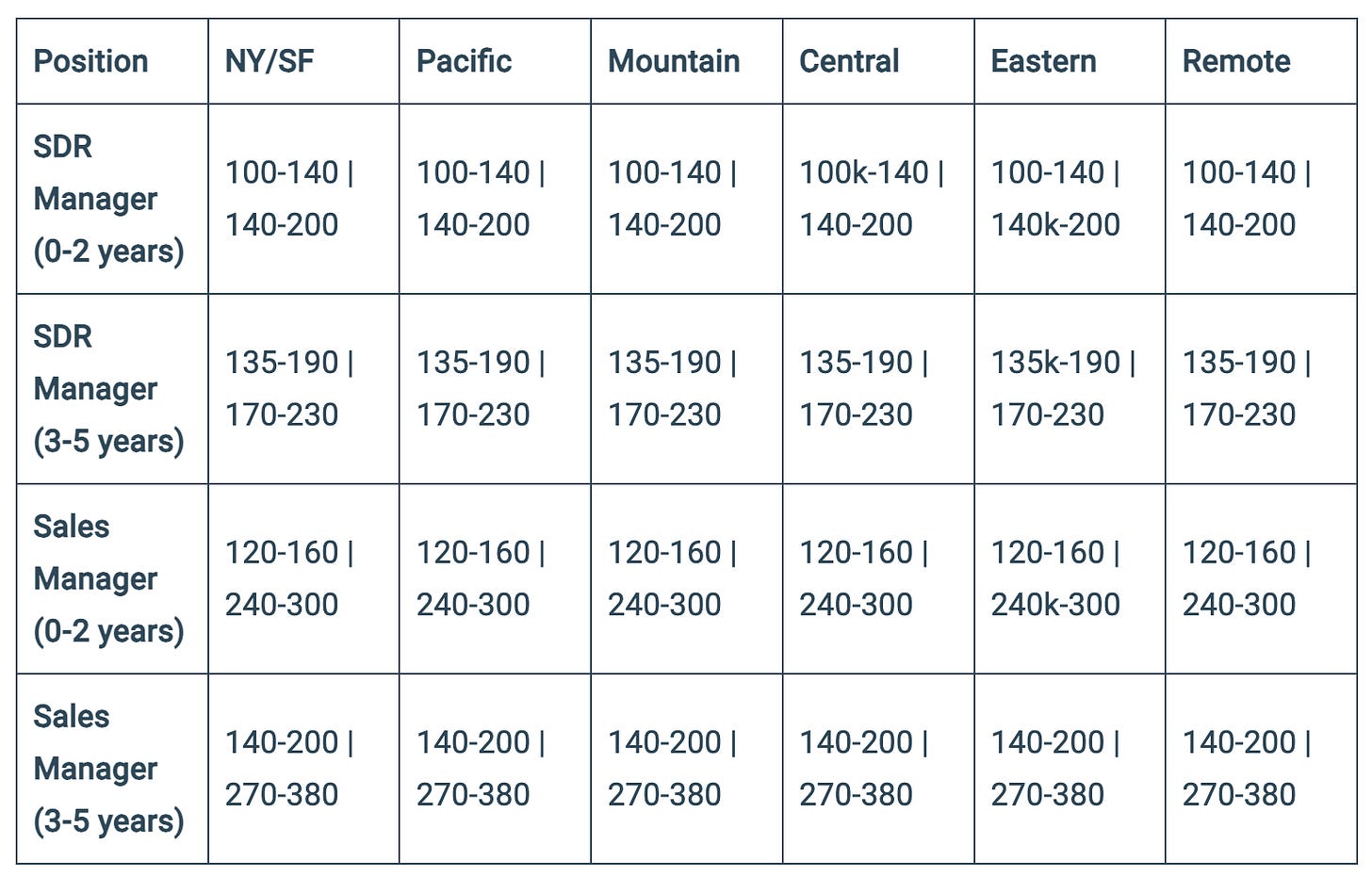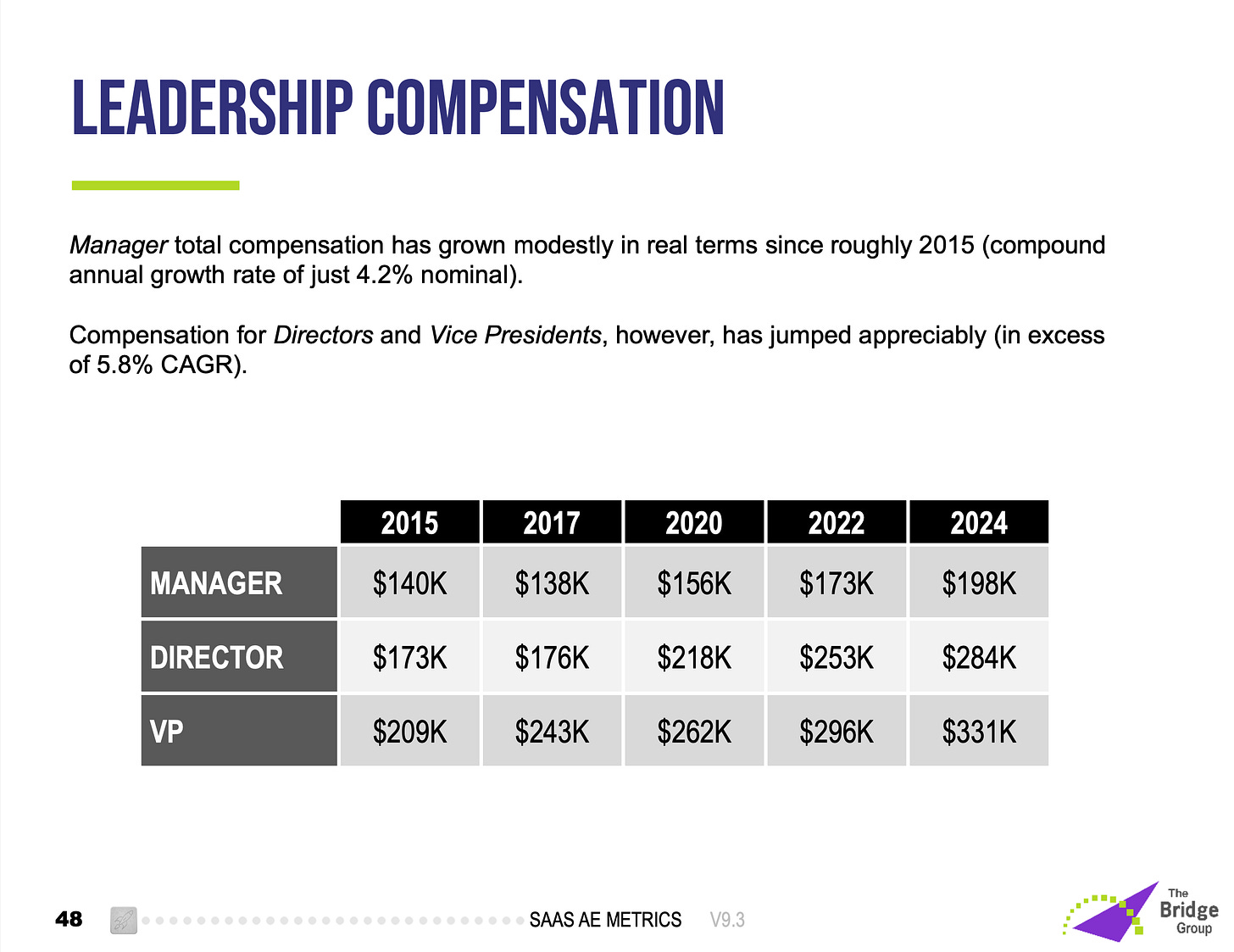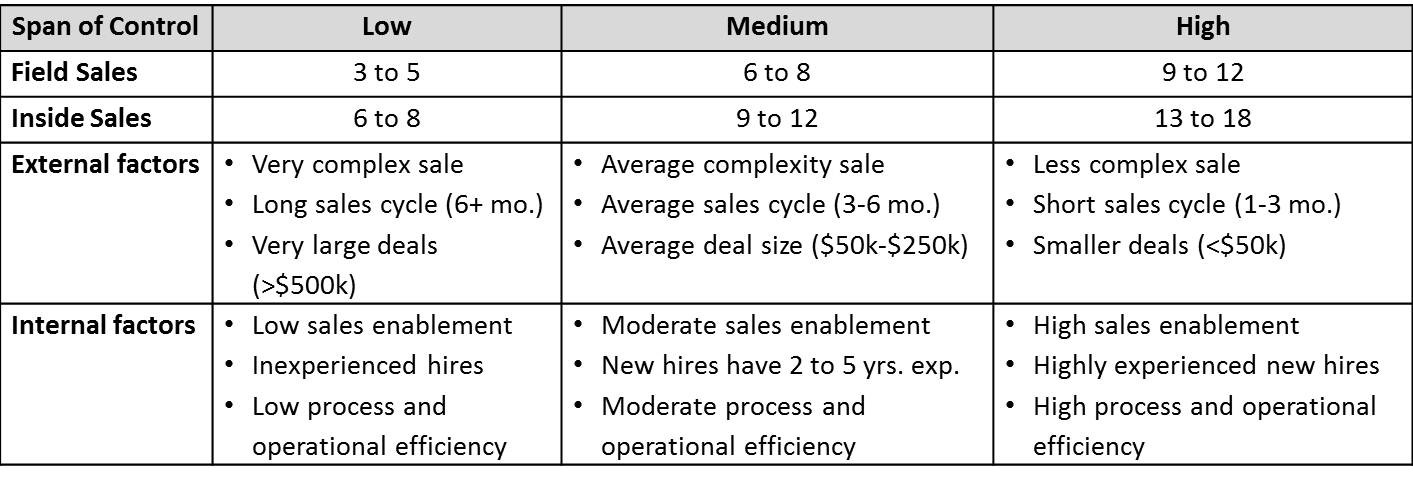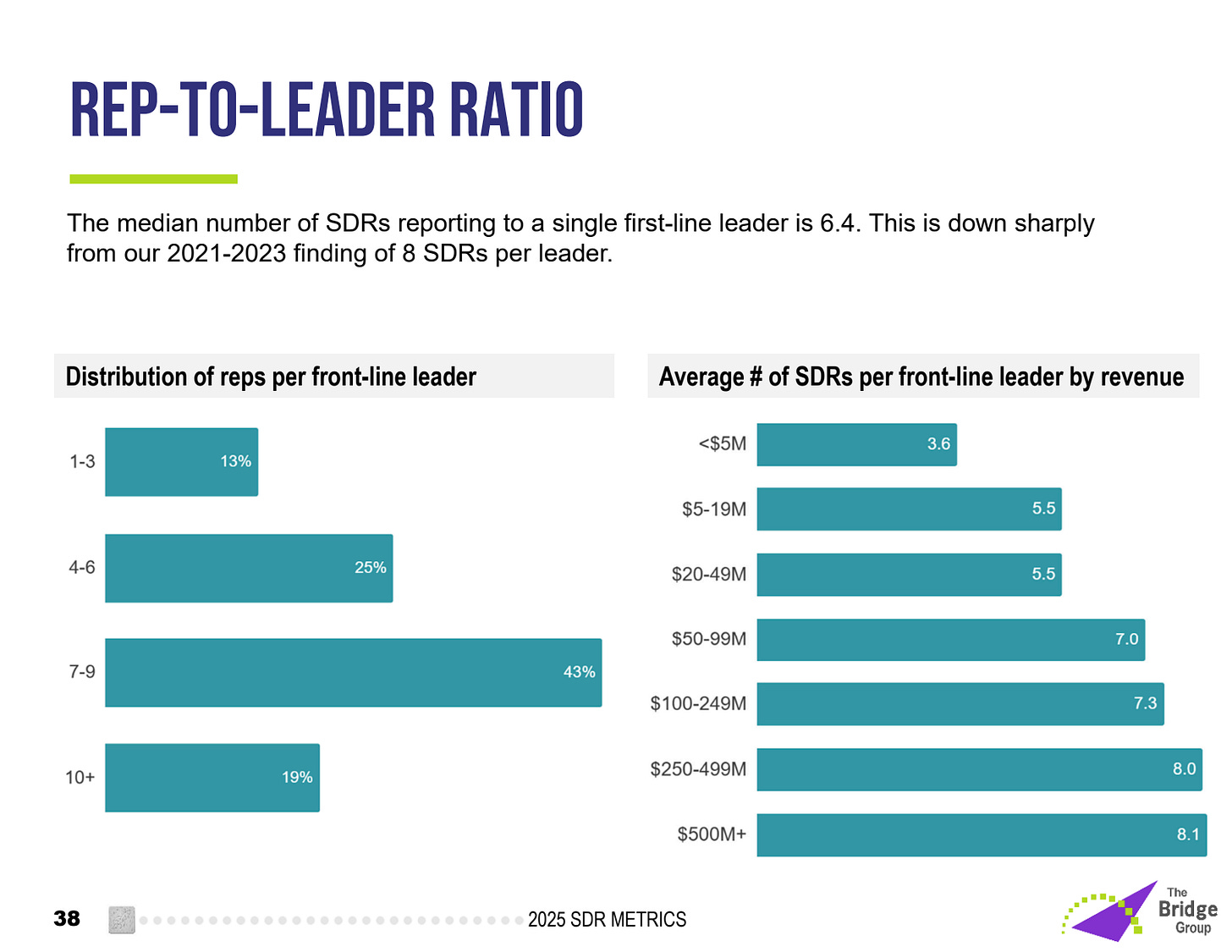Stop Failing Front-Line Sales Managers
The highest-leverage role in GTM deserves some help. (Plus benchmarks!)
The conventional wisdom is that SDRs have the hardest job in sales. I don’t disagree. The 2nd hardest job? Being their manager. Whether it’s managing BDRs or AEs, the front-line sales manager has it tough.
Wrangling 6-10 sales reps while being responsible for their collective number is hard enough on its own. Add in that, for many sales managers, they’re in their first people management job. Then, top it all off with the fact that most orgs do very little to enable their managers. It’s a perfect recipe for missed targets and burnout. Not just for the managers themselves, but for their reps as well.
And that’s where it gets interesting. These front-line managers are probably the highest-leverage role in your whole GTM team. Whatever you do to help or hamstring managers has an outsized impact. As your front-line managers go, so go 6-10 reps.
This means front-line managers are key to unlocking GTM performance. They’re integral to change management and they shape your team’s culture. Unfortunately, you’re probably shooting yourself in the foot by not supporting them well enough across all facets of their job.
Let’s dig in.
Front-line managers are the face of change
Think about the last time your rolled out a new comp plan or territory design. Did you get buy-in from your front-line managers first? If not, how’d that go? If you’re trying to make changes, front-line managers are your biggest friend or your biggest foe.
That shouldn’t be a surprise. Front-line managers are the first line of defense for any company policy. They don’t get the luxury of delivering a “vision” in a “we’re all gonna get rich” speech from a stage at SKO. Instead, they have to answer a million questions about a million details from anxious reps. Oh yeah, and they have to do that whether they understand or support the policy themselves.
If the managers understand why the policy change is necessary and understand how it’s going to be implemented, then those millions of questions never rise to the level of complaints much less to a revolt on the sales floor. If they don’t understand those things, good luck holding the line.
At a previous company, we decided to roll out a massive overhaul of our messaging. It involved the reps pitching our offering in a completely new way. The goal, as usual with these things, was to do a little category creation to create some differentiation that would help us command higher ACVs.
Our 60-odd reps already had an idea the change was coming and they weren’t super happy about it. They felt like the old messaging was working well enough and they were comfortable delivering it.1 Why change?
We knew we had to act fast or we risked losing the sales floor before we even rolled anything out. So we started with the front-line managers. We brought them together, explained the messaging and incorporated their feedback before we did any rep enablement. By the time we actually delivered anything to the reps, the managers felt ownership.
The team didn’t stop there, because we knew we had to ensure the reps actually followed through and delivered the messaging. We set up some AI-based analysis of our call recordings to track which reps were delivering the messaging and which weren’t. That way we could see what was going on.
Then we turned it into a team competition. We showed compliance by team on the leaderboards throughout the office and we had team-level spiffs (including donating to a charity of their choice). This gave managers incentive to drive rep behavior instead of requiring the enablement team to constantly cajole reps who weren’t holding up their end of the bargain.
It worked beautifully. Within a month, nearly all of our reps were delivering the new messaging—and doing it well. It would have required an absolutely herculean effort from our under-staffed enablement team (of one) to achieve even half the results, had it not been for the leverage we got by working through those front-line managers.
This lesson is one of the key reasons we focus on front-line managers when we roll out dynamic books to Gradient Works customers. It’s why we run enablement sessions with them and it’s why give them deep pipeline creation analytics to help them better coach their reps. If front-line managers don’t see how Gradient Works drives more pipeline and helps them be more successful at their job, the organization ultimately won’t see a return on their investment in the platform.
So if you take nothing else way away from this article, remember this one thing: involve your front-line managers early and often with any big change. Otherwise, expect them (and their reps) to show up at your office with pitchforks.
Front-line managers drive culture
We’ve established that front-line managers are the key to successful change management. But why? Well, obviously their efforts (good or bad) are magnified by the number of reps that report to them. But I’d argue it runs deeper than that.
Front-line managers form the core of your sales team’s culture.
First, they’re often (though not always) promoted from within and represent “what good looks like” at the organization. We know the skills required to be an elite sales rep aren’t the same skills required for management (see Michael Jordan’s 423-600 record as the Charlotte Hornets’ owner). That said, nobody’s promoting an unsuccessful rep to manager. These managers become role models for the rest of the sellers.
Second, they’re deeply involved in the hiring process and the reps they hire will go on to shape the culture. This gives them a tremendous amount of influence on whether new hires raise (or lower) the bar on the team.
Finally, front-line managers are the emotional engine of your sales org. Sales is dominated by disappointment—even the most elite sellers will hear “no” way more often than they hear “yes”. Great font-line managers are strong coaches and motivators. They correct as necessary but are always willing to lend their energy to anyone who needs a boost.
Nobody does more to shape the actions your sellers do each and every day—the actions that build pipeline and close deals—than front-line managers.
Unfortunately, those front-line managers are often forced to make it up as they go along.
Front-line managers deserve more support than they get
Not every front-line manager is early career or in their first management role, but most are. Most of the folks reading this article have long since forgotten what it feels like to jump from IC to manager. One day you’re just trying to make your own number then the next day you’re handling 1:1s, interpersonal conflict and performance reviews.
These managers are also thrown into an increasingly analytical and technical role—second only to RevOps in the GTM org. I was having a conversation yesterday with a couple RevOps leaders who are pushing their sales managers to take more ownership of building out routing workflows and enriching data with Clay. That’s on top of requirements to understand a software stack that likely includes CRM, call recording, a parallel dialer, sales engagement and interpreting whatever internal dashboards ops has cooked up. It’s a lot.
Learning management skills and playing a part-time RevOps pro should be enough. But wait, there’s more! There’s the actual job of sales management. Pipe review. Unsticking deals. Coaching. Forecasting. And, of course, hitting the number.
In short, it’s a hard job that requires a breadth of skills. But according to recent research by SBI, sales orgs do a poor job of training front-line managers.
Per SBI’s report:
While nearly every enablement team (96%) in our recent study reported functional responsibility for seller training, we found roughly 40% of teams have no dedicated sales manager training program. […] Moreover, for those that do have a dedicated program for frontline sales managers, only a third (34%) accomplished training for all managers in the most recent 12-month period.
If I’m reading this right, only about 21%2 of sales orgs actually train all managers. This is despite a 7% increase in quota attainment for teams that have a dedicated sales manager training program3.
SBI also calls out the lack of technology training. Even among top performing enablement teams, only a quarter (24%) consider technology training a top priority. However, that’s double the average for the whole survey (12%) which seems telling.
This is only one survey, but I will say it fits with my experience working with sales managers. Most of the enablement energy goes towards reps and specific sales skills with very little going to help front-line managers do the rest of their job well.
I’ll add one other area from my personal experience. I think most front-line sales managers struggle with analytics and data literacy. That includes three areas:
Analyzing the data the ops team foists on them. I’ve seen some truly overwhelming dashboards built at great cost of time and resources that simply don’t tell a story that’s interpretable or relevant to a front-line manager. This is a mutual problem—managers don’t know what really matters so they ask for everything. Ops gives it to them. We’d all be better off with less data, more often.
Taking data-driven action. Reply rates were 1.1% last week (1 reply) and they were 2.3% (2 replies) the week before. Do you change your entire sequence? Front-line managers often struggle to derive signal from noise because they rarely have either the statistical knowledge or the “feel” that comes from experience.
Communicating with data. Front-line managers often struggle to use data to communicate with leaders and other stakeholders. They get bogged down in minutia (CROs rarely care about call connect rates) or try to use data to “pass a test” when what leadership really wants is to see that they can clearly identify material problems, explain the root causes and show how they’re addressing them.
It’s clear that sales organizations owe their front-line reps higher-quality enablement in all facets of their job. That should include giving their front-line managers simpler, more impactful, reporting in combination with training on data analysis and communication.
Wrapping up
Front-line sales managers are often learning key skills on the job—managing people, wrangling tech and interpreting data—while still having to hit a number. And they’re doing it without much support in most organizations.
That’s got to change. Better managers mean better change management, better culture and better results. They’re the highest-leverage part of our GTM organizations and it’s time we started treating them that way.
It’s planning season now. If your organization isn’t truly planning to invest in front-line manager enablement in 2026, change the plan.
Bonus: Front-Line Sales Manager Benchmarks
As part of pulling this article together, I found some benchmarks for front-line managers that might be useful so I figured I’d share them.
Compensation
Betts Recruiting has a detailed write-up on sales manager compensation in 2025. You can see it summarized below:

The Bridge Group has their own—much less detailed—cut for sales manager compensation. However, it does show how compensation has changed over the last decade. Managers have lagged behind more senior leaders in OTE growth.

Rep-to-Manager Ratios
I’ve often seen 6-10 reps per manager as a rule of thumb (with 10 being on the high side). The Alexander Group has done some research about front-line sales manager span of control and published this table:

The Bridge Group has a breakdown for SDRs in their 2025 Sales Development Metrics report:

Like all fast-growing startups, messaging had drifted around quite a bit. Reps basically gave whatever pitch they had learned when they first started. That was another reason for the comprehensive overhaul.
I believe SBI’s research is saying that 62% of sales orgs have a manager training program. Of those, only 34% managed to train all their managers. (62% x 34% = 21.08%)
See page 7 in SBI’s report.






This is outstanding! Sadly, it's not new news. Back in the mid-2000s Dave Stein and others published a lot of research comparing spending on front line manager training with all other training. It was a small percentage of spending--on one of the highest impact jobs in selling.
And there has been continued research on this, yet it doesn't get the attention it needs.
Now with AI, we see much reporting about dramatically increasing spans of control for front line managers. Which further exacerbates the challenge.
Separately, just as we know it's important to provide ongoing coaching to our front line sellers, it is equally important to provide coaching to management. It's not just training and tools.